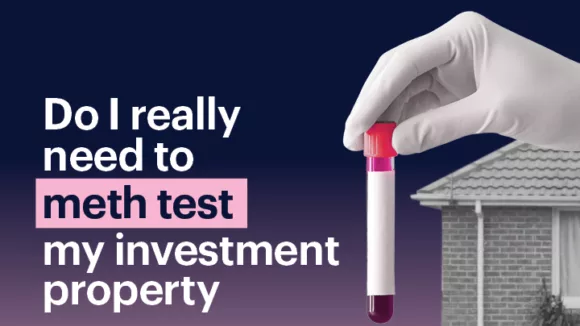
Property Investment
Do I really need to get a meth test for my investment property?
You’ll learn what a meth test is, why it has been considered so important in the past, and what the current science says about testing levels.
Property Investment
5 min read

Author: Tiffany Bracey
Property Manager Team Leader at Opes Property Management Auckland.
Reviewed by: Jess Knight
Business Development Manager with over 5 years of experience in Property Management in Auckland.
Should you get a baseline meth test for your property?
And is it really worth the cost, or can you afford to skip it?
That’s a question my team at Opes Property Management gets all the time from investors.
In this article, you’ll learn:
A baseline meth test isn’t essential for every landlord, but it is the only way to prove when contamination happened. This can make insurance claims easier and protect you financially.
A baseline meth test is done right at the start when you buy a property. Typically, it’s done when you buy the property (settlement) and is a condition of sale.
The goal is simple: to prove the property’s meth-free condition before tenants arrive.
That way, if meth is detected when your tenants move out, you can show for sure that those tenants caused the contamination.
But here’s the catch – to prove that you’ll also need to do a test at the end of each tenancy too. Because otherwise how do you prove which tenant caused the contamination.
On a technical level, a baseline meth test and a standard meth test are the same process. The cost is also the same (more on this below).
A qualified tester takes swabs from around the property, and the samples are analysed for meth.
The difference is in when and why you do the test:
For many landlords, this might feel like overkill.
But the reason baseline testing exists is because of the fine print in insurance policies.
The meth testing conversation has gone back and forth in NZ.
At first, everyone was told to test. Then, Peter Gluckman (Chief Science Adviser to New Zealand’s Prime Minister at the time) wrote a report. He basically found that testing wasn’t necessary most of the time.
But now it’s the insurers who want clearer evidence. This is where baseline testing comes in.
In most cases insurance companies want to establish when the meth contamination happened and (ideally) who was responsible.
If you can’t prove when the contamination occurred, then they often won’t pay out to fix it.
Without a baseline it’s harder to prove whether the damage happened last year, five years ago, or your most recent tenants.
If you can show through a baseline meth test that this tenancy caused the contamination, you may be able to:
Although every insurance policy is different, so check the fine print or talk to your adviser.
If you can’t prove which tenant caused the contamination, your insurer might still pay.
But it’s harder and you’ll be relying on circumstantial evidence like complaints, property damage, or tenant behaviour.
Thanks to the Gluckman report landlords only need to decontaminate if meth levels are above 15 µg per 100cm². For context, that level used to be 1.5µg per 100cm².
Meth tests are extremely sensitive; even someone walking through after smoking a single pipe can leave a trace.
Here’s how results are read:
But keep in mind there are two types of tests:
Baseline tests cost around $200–$250, depending on the company you use and the size of your house.
The final results should be compiled in a lab. That way you know the test is accurate.
This price obviously rises the more areas you test.
If you do them after every tenancy, that’s potentially an annual bill
And for many landlords the low chance of meth issues makes that feel like an expensive safety net.
Property managers say the number of genuinely high readings is rare.
In fact, many cases that come back “positive” are still well below the threshold. In those cases, a standard sugar-soap clean and a good carpet shampoo will often bring readings down.
So you can pay for a baseline meth test, prove there was meth use in the house, and still not have to do much to decontaminate the property.
My advice to my investors is that not everyone needs a baseline meth test, but it comes down to your risk appetite:
| Pros | Cons |
Removes any doubt about when contamination occurred. Strengthens your insurance claim (if readings are high enough). Peace of mind. | It costs $200–$250 every tenancy (potentially every year). High readings are rare. You might be paying for a test you’ll never need. |
A baseline meth test is like paying a small premium for a very specific kind of insurance.
If you want airtight proof for insurers – or peace of mind that you’ve covered every base – it can be worth it.
But if you’re comfortable taking the small risk, you can skip it and save yourself the cost.
Property Manager Team Leader at Opes Property Management Auckland.
Tiffany is an experienced property manager who understands the importance of strong systems to deliver top-tier service. She is committed to staying ahead of the ever-changing compliance requirements under the Residential Tenancies Act 1986.
This article is for your general information. It’s not financial advice. See here for details about our Financial Advice Provider Disclosure. So Opes isn’t telling you what to do with your own money.
We’ve made every effort to make sure the information is accurate. But we occasionally get the odd fact wrong. Make sure you do your own research or talk to a financial adviser before making any investment decisions.
You might like to use us or another financial adviser